Peter MALONE
Agatha Christie's Poirot Murder on the Links

MURDER ON THE LINKS
UK, 1996, 93 minutes, Colour.
David Suchet, Hugh Fraser, Diane Fletcher, Damien Thomas, Ben Pullen, Kate Fahey, Sophie Linfield, Jacinta Mulcahy, Bill Moody, Bernard Latham, James Vaughan.
Directed by Andrew Grieve.
This is a rather lavish production in the television series of Agatha Christie murder mysteries featuring David Suchet as Poirot.
While the title might seem mundane, the setting is actually the French resort of Deauville, hotel, mansions, the railway station. In fact, audiences will enjoy the different locations for this film. It opens with newsreel footage and a scene of the narrator speaking his commentary. The excerpt finishes with a close-up on the face of the little daughter involved in a murder case, her mother killing her father, involved with his business partner.
The action takes place 10 years later, a focus on a businessman and his family, the focus on his adopted son and the young man’s relationship with a singer and then with a neighbour. The businessman is found dead on the golf links with a knife in his back. His wife has been tied up in an abduction situation.
The action is rather complex, with two of the characters admitting to guilt to protect the other. And, Captain Hastings becomes infatuated with a young French singer. The initial newsreel case comes to its fulfilment in the episodes in this mystery.
1. The popularity of the Agatha Christie murder mysteries? Television series with David Suchet as Poirot?
2. The French setting? Deauville as a resort? Hotels, golf links, mansions? The railway station? The visit to London? The musical score?
3. The newsreel opening, the visuals, the murder case, the wife, the long focus on the little daughter? The voice-over and the announcer? Editing? Poirot later visiting and looking at the footage?
4. Hastings and Poirot going to France? Jokes about sports and golf links? Hastings’ golf clubs? The name of the hotel? Settling in? The singer, Hastings being fascinated? The sad song? Paul Renaud and his seeing Poirot, the confidential talk, asking his protection?
5. Renaud and his wife, his jewellery business, Santiago, success, sending his stepson? Jack, working for his stepfather, resentment? The romance with Isabella? Breaking it? Taking up with Martha? Martha’s mother and her approval? The chuffeur taking Jack to the train, his departure, his return? Allegedly staying at Cherbourg, changing his mind, lying about his return? The stationmaster seeing him?
6. Hastings, his game of golf, the ball in the bunker, the discovery of the dead body? The knife in the body? The issue of the knives, Jack and his gifts, his mother, Isabella, Martha? The final revelation?
7. The story of the wife tied up, the abduction? The news of her husband’s death? The parallel with the initial story and newsreel? The same method?
8. Poirot and his investigations? The French police, the superintendent, the sparring between Poirot and the in superintendent? Double vanity? The wager about the pipe and the moustache?
9. Hastings, his encounter with Isabella, walking and talking, the lunch, her getting the information, to the police precinct, her taking the knife? His shielding her from Poirot?
10. The tramp in the shed, the change of clothes, the dead man and his coat, the letter in the coat, B.D.? Identification?
11. The interrogations, the truth about Paul Reynaud, his involvement in the previous case? His wife knowing, concocting the plan? Martha overhearing it, the wall and people listening in?
12. Jack confessing, going to court? Isabella arriving in the court, saying she was guilty? In prison?
13. The wager between the French superintendent and Poirot? Clipping his moustache? The bringing of the pipe?
14. The revelation of the truth? Martha guilty? The truth about her mother and blackmailing Reynaud? Jack and Isabella each protecting the other?
15. Poirot, helping Hastings, getting Isabella – and the romantic ending
Agatha Christie's Poirot King of Clubs
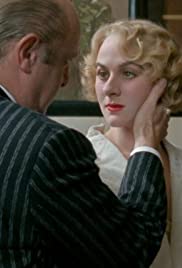
THE KING OF CLUBS
UK, 1989, 50 minutes, Colour.
David Suchet, Hugh Fraser, Philip Jackson, Niamh Cusack, Jonathan Coy, David Swift, Sean Pertwee.
Directed by Renny Rye.
A short story in the television series of Agatha Christie mysteries starring David Suchet as Poirot.
The initial setting is a film studio, a bullying producer, a novice director, an actress being threatened, a veteran actor fluffing his lines. This leads to the story of the death of the producer – and the twist is that it actually was an accident being reconstructed as a murder. Captain Hastings accompanies Poirot to the film studio. Chief Inspector Japp is called in to investigate the case.
Enjoyable to watch but rather minor in comparison to other cases.
1. The popularity of Agatha Christie mysteries? The television series with David Suchet as Poirot?
2. The title, the clue, discovering the behaviour of the family, the lies, the conspiracy?
3. The London setting, the film studios, the mansions, the countryside and roads? The musical score?
4. The filming, the style of 1936? Performance, the role of the producer, the role of the young director? The ageing actor and his failure? The humiliation of the actress? The visit of Poirot and Hastings? The anonymous Prince? The role of the actress, the confrontations with the producer? His demands?
5. The countryside, the director driving, the actor drunk, the crash?
6. The discovery of the producer’s body? The room, the position of the body, the open curtain? The manservant? Poirot and Hastings examining the room? The neighbours and family, and the actress taking refuge? The card game and the explanations? The missing card and an hour’s play? Facing the window?
7. Poirot and the truth, the story about her father, financial difficulties, the producer blackmailing the actress? Her family home? The family all helping? The visit of the actress and her brother to the producer? The accident of his falling? Then moving the body, to make it seem like murder?
8. Poirot, the discussions with the family, his discretion? Hastings bewildered?
9. The filming being renewed, success all round?
Agatha Christie's Poirot Theft of the Royal Ruby
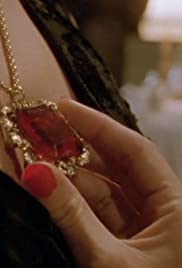
THE THEFT OF THE ROYAL RUBY
1989, 50 minutes, Colour.
David Suchet, Frederick Treves, Stefanie Cole, David Howey, Tariq Alibarti, Helena Mitchell, John Vernon, Nigel Le Vaillant, Robyn Moore, Siobhan Garahy.
This is an early film in the television series of Agatha Christie mysteries with David Suchet as Poirot. It is a story of robbery rather than murder.
There is a genial Christmas setting with guests gathering, with the singing of carols in the church, with gifts, and, especially the mixing of the pudding, eating the pudding – and the discovery of the Ruby in the pudding.
While there are a number of suspects, the villain this time is rather obvious, and a woman posing as his sister, an accomplice in the robbery. There is also the problem of a romantic infatuation by the daughter of the colonel, the host of the Christmas celebration.
The children the family plan to invent a murder to trick Poirot – however, he tricks them and stages a fake murder to unmask the villain. However, the villain has a plane and there is a car chase to the airport, finally stopping the plane.
The film gives some background to the international situation in Egypt and British involvement as well as thieves finding funds to support rebels – hence the stealing of the Ruby from the Prince of Egypt.
1. The popularity of the Agatha Christie mysteries? The television series? David Suchet as Poirot?
2. The political situation of the times? Egypt, the King, the reckless Prince, the Suez Canal, British politics and interventions? Financing of local rebellions?
3. The Christmas setting? Family, gifts, carols in church, plum pudding – especially the pudding? The musical score?
4. The introduction to the Prince, aged 19, foppish, spoilt, his companion, her stealing the Ruby? His upset? His bad manners?
5. Poirot, being apprehended, taken to the diplomat, the situation, his disapproval of the Prince? The invitation to go to the house for Christmas?
6. The family, the colonel and his Egyptology background, his need for finance, his concern about his daughter and the visitor, his assistant and trying to work out what to sell? The invitation for Christmas?
7. Poirot, his being welcomed, the colonel and his wife, their daughter and her infatuation, the assistant and his love for the daughter, the visitor and his sister? The introduction to the suspects? The staff, the kitchen, everybody stirring the pudding, the cook, the maid – and her intervention? The children and their games, planning to trick Poirot?
8. Poirot, seeing the visitor, his drinking the coffee? The note in Poirot’s bed warning against the pudding? The maid overhearing the talking church, writing the note? The meal, the pudding, the Ruby, Poirot saying it was glass? Poirot not drinking the coffee, the colonel?
9. The girl, the dead body, the knife? The visitor checking, finding the Ruby, taking it? The set up by Poirot?
10. The visitor and his sister, the car, the plane, the pursuit, the police, stopping the plane? The arrest? The sister not being the sister but the woman who stole the jewel?
11. A rather more obvious villain than usual?
12. The colonel preserving his treasures from Egypt? And the Prince, hopefully, learning a lesson?
Agatha Christie's Poirot Adventure of the Clapham Cook
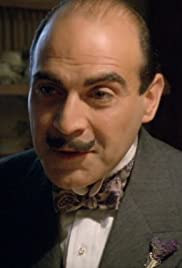
THE ADVENTURE OF THE CLAPHAM COOK
UK, 50 minutes, Colour.
David Suchet, Hugh Fraser, Philip Jackson, Pauline Moran, Brigit Forsyth, Dermot Crowley, Frieda Dowie, Katy Murphy, Danny Webb.
Directed by Edward Bennett.
This is the first of the 70 films in the television series of Agatha Ms Christie mysteries with David Suchet as Poirot.
At times, he is surprisingly grumpy, not characteristic of his later presence. He is also very snobbish but learns a lesson. Busy, wanting cases, he turns down the opportunity to finding a missing cook. However, is challenged by the lady of the house and he and Captain Hastings begin to investigate. However, the audience has already seen a character collecting the cook’s clothes and with a huge case.
While the fate of the missing cook is happily accomplished, there are further complications, especially with a robbery in a bank. The boarder in the house where the cook works seems a simple simpering type but, of course, turns out to be an archvillain, murdering a fellow worker, stealing from the bank, putting the the bank assistant’s body in a box and sending it to Glasgow while he escapes with the money, attempting to sail to Venezuela.
Hastings is rather incomprehensible as so often, Inspector Japp is also sceptical, but takes Poirot’s word and the case is solved (although, there is a red herring when the railway assistant says he saw Bolivia on the bank notes but Poirot realises that it is BolÃvar, the currency of Venezuela).
And the series is on its way, finishing 70 episodes later in 2013.
1. The popularity of the Agatha Christie mysteries? David Suchet as Poirot, the beginning of his performances?
2. The London settings, the apartment block where Poirot lives, his flat and office, Hastings prison, Miss Lemmon and her work? The visit to Clapham? The visit to the Lake District – and Poirot preferring the city? Southhampton and the wharves? The musical score and the first outing of the popular theme music?
3. The audience initially seeing the boarder, packing the cook’s clothes? The box and the rope?
4. Mrs Todd, coming to see Poirot, his refusal of the case, her accusation of snobbery, his accompanying her to Clapham? The situation of the cook, her day off, her disappearance? Sending for her things?
5. The interview with Simpson, his seeming simplicity? Alibi and explanations? The truth, his plan, the murder, the box, at the railway, sending the box to Glasgow, the robbery, going to the wharf?
6. Mr Todd, against Poirot, dismissing him, sending a guinea fee?
7. The idea of the ad in the paper, the cook replying, the address in the Lakes District, the trip, Poirot not liking the countryside at all, not seeing the view? The house, meeting the cook, her explanation, sending the note to Mrs Todd, the agent from Australia talking with her, the legacy, the house, her going to the house?
8. Poirot, the bank, the assumption who was the thief, days and alibis, Simpson saying he was sick? The truth?
9. The collection of the box, at the railway station, the assistant, surly, eventually the information about Bolivia?
10. Inspector Japp, Hastings, their going to the wharf, the ship not sailing? The BolÃvar instead of Bolivia? Apprehending Simpson?
11. Case solved – and 69 more in the series?
Agatha Christie's Poirot Chocolate Box
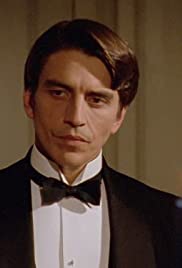
THE CHOCOLATE BOX
UK, 1993, 50 minutes, Colour.
David Suchet, Philip Jackson, Rosalie Crutchley, Anna Chancellor, David de Keyser.
Directed by Ken Grieve.
This is an Agatha Christie short story. It came early in the series of 70 television films with David Suchet as Poirot. It offers the opportunity to know something about Poirot before he came to England.
The opening setting is Belgium the outbreak of World War I, a politician and the accidental death of his wife, his firm stances against the Catholic Church, political unity in Belgium. He is later found dead, eating Belgian chocolates, considered a stroke or suicide.
The young Poirot is a police Inspector, dissatisfied with the verdict of suicide, responding to the appeal of the politician’s wife’s cousin, played by Anna Chancellor early in her career. Poirot investigates, with various suspects, finally the revelation that the politician’s mother had, in a sense, executed her son, for political and cultural reasons. She is played by Rosalie Crutchley towards the end of her career.
The occasion is Inspector Japp being honoured by the Belgian government, his travelling to Brussels with Poirot, returning home for the first time.
1. The popularity of Agatha Christie? The mysteries? The series with David Suchet as Poirot
2. The screenplay based on a short story? Brief, effective? The solving of a mystery in the past?
3. The Belgian settings, the city of Brussels, railway station, hotels, classic buildings? Homes and apartments? Restaurants? The musical score?
4. An opportunity to see Poirot before he came to England? As a Belgian policeman? Younger, detection, interrogations, the case, his theories? The solution? His covering the solution? Opening it 20 years later?
5. The situation with the politician, at home, clashes with his Catholic wife, his anti-Catholicism, the split in Belgium between Walloons and the Flemish? His devout mother? His wife falling down the stairs – and the later revelation of his pulling the carpet from beneath her? His political ambitions? The dinner, the quarrel with his friend, the guests? In his office, eating the chocolates, his death?
6. The official investigation, the decision of the suicide, the chief of police covering up? Forbidding Poirot to investigate? Poirot’s later pleas, his condemnation? The politician’s friendship with a fellow officer? Difference of opinion? His friendship with the chemist, analysing the chocolate remnants? The poison?
7. The suspects, the friend and his quarrel, later Mayor of Brussels, his anger with Poirot for 20 years? Gaston, mediator, medication, his collapse?
8. The cousin, Virginie, her presence at the dinner, not believing the suicide, her engaging Poirot? The bond between them? His devotion to her, the gift, his wearing it on his coat 20 years later? The investigation? Meeting her again, marrying his friend, the two sons?
9. The victim’s mother, her devotion, strength of character, the photo of her son with his wife? At the meal? The revelation of the truth? Her condemning her son, his politics, antireligious? Killing him – and her sense of duty and loyalty to Belgium?
10. Poirot, not revealing the truth?
11. Inspected Japp, the bond with Poirot, his receiving an honour from the Belgian government, the meal, the discussions, the re-creation of the crime? The ceremony?
12. A glimpse of the younger Poirot?
Agatha Christie's Poirot ABC Murders
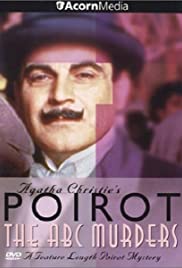
THE ABC MURDERS
A, 1992, 103 minutes, Colour.
David Suchet, Hugh Fraser, Philip Jackson, Donald Sumpter, Donald Douglas, Nicholas Farrell.
Directed by Andrew Grieve.
The ABC Murders is one of Agatha Christie’s best-known novels. It was filmed as The Alphabet Murders during the 1960s by the same company which made the Miss Marple films with Margaret Rutherford. It veered away from details of the novel. An American comedian, Tony Randall, was Poirot with Robert Morley as Hastings.
The BBC made a three-part version in 2018 which kept the core of the plot but veered away in many details, eliminating Hastings, killing off Japp, having what might seem an extraordinary background story for Poirot, played unexpectedly by John Malkovich, as a parish priest during the German invasion of Belgium in World War I, the effect on him raises doubts in his ministry, coming to England and becoming the celebrated detective.
This version is much more straightforward, one of the earliest of the 70 television films with David Suchet as Poirot and Hugh Fraser as Hastings, Philip Jackson as Inspector Japp
Poirot receives letters announcing murders in successive towns, starting with A, B, C, D. And the letters are signed ABC. Poirot investigates each case, challenged by successive letters. He visits the site of each murder, conducts interrogations.
The audience also sees a middle-aged man with an epilepsy background, going to watch thrillers of the cinema, door to door selling of stockings which is the initial clue as to the identity of the killer. After the last murder, the salesman is bewildered and gives himself up to the police. Good performance by Donald Sumpter.
A group of friends of the victims has gathered together to try to solve the case with Poirot and Hastings. Poirot gathers them together, highlights the fact that there is only one murder which benefited those connected – which means that the others were murders arranged to mislead and a chance encounter with the epileptic man led to the plan, the typing of the letters, giving him the typewriter, the stockings, and giving him orders, as if from the stocking company, to go to various locations – where the murders were committed.
1. The popularity of Agatha Christie’s novels? The film versions? With David Suchet as Poirot?
2. This classic status of this book? Other film versions? This version close to the novel?
3. The title, the letters to Poirot, the signature, the choice of the alphabet for the murders? The cover for the main intended murder?
4. Poirot and Hastings, friendship, collaboration and investigation, Hastings return from South America, the crocodile gift, the smell, the place in the apartment? And the final gift and story for Cust? Hastings staying with Poirot – and the washing up and drying up of the plates?
5. The letters, the challenge to Poirot? The wrongly addressed envelope and the consequences?
6. The involvement of Inspector Japp, Scotland Yard, his step-by-step investigations, lack of imagination, support of Poirot?
7. The first murder, the elderly later lady, her German husband and his protests? Her niece, in service, upset? The second murder, the young girl, waitress, her snobby employer, the sadness for her family, her strong-minded sister, the boyfriend, his lack of alibi, his anger? The third murder, the wealthy mansion, his wife and her cancer, her observations of Thora and the visitor? Franklin Clarke, friendly, welcoming, his involvement with the group and their investigations? Thora, the victim and his attraction, possible marriage? The fourth murder, the D, Cust at the film, the stabbing?
8. Poirot, the continued investigations, looking for clues? Hastings and his help? The visits to the various families? Going to Doncaster? Expectations? The races?
9. The question as to who would benefit from each murder? Targeting Franklin Clarke? The group together, the explanation, the recreation of the murders, the typewriter, the letters typed before it was sent to Cust, asking him to be a stockings salesman, each murder?
10. Cust, his mental health, seeing him at the cinema, his discussions with his landlady, going to Doncaster and not Cheltenham, the stockings, the cinema, the knife in his pocket, the blood, report to the police? His being apprehended? In jail, his epilepsy, his lack of memory? The gift of the typewriter, the stockings? His following orders? His mother saying he would be most famous – and the irony of his being innocent, the newspaper wanting interviews with him?
11. The ingenuity of the plot? The investigation? The clues? The solution?
Total Control
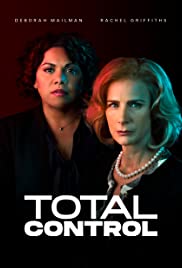
TOTAL CONTROL
Australia, 2019, 300 minutes, Colour.
Deborah Mailman, Rachel Griffiths, Harry Richardson, Rob Collins, Celia Ireland, Wesley Patton, Huw Higginson, David Roberts, Shantae Barnes- Cowan, James Sweeney, Anthony Hayes, Aaron Pedersen, William Mc Innes, Trisha Morton- Thomas, Sasha Horler, Tony Barry.
Directed by Rachel Perkins.
A six-part limited series produced by the Australian Broadcasting Corporation. The series was well received and nominated for many local awards, winning for Deborah Mailman and her striking performance.
On the one hand, the film was shot in outback Queensland, the town of Winton, bringing it to life with overviews and details of homes, streets, shops, the aboriginal community. This comes to the fore when an American request to establish a base there has to be considered in the light of Native Title, Deborah Mailman, as Alex Irving, having to chair the meetings, bring disputing groups together.
On the other hand, this is a film about Canberra and Parliament. After Alex is seen confronting a shooter and staring him down, she is taken up by the media, comes the attention of the Prime Minister (Rachel Griffiths) who is facing an election and wants to shore up support after the death of a Senator. She sends her assistant, Jonathan (Harry Richardson) to negotiate with Alex. He is out of his depth and fails. The Prime Minister herself comes to make her case and persuades Alex to go to Canberra, and asks her to negotiate the native title issue. However, there are all kinds of double dealings, factions in the coalition room, challenges to the Prime Minister, backing down on agreements.
In the meantime, there is an episode in the Northern Territory detention centre, a young girl with asthma having an attack after taunting the police and their throwing into the cell a smoke bomb. Her companion has filmed everything, escapes, makes her way to Canberra to plead the cause, experiencing difficulties, wanting to contact Alex. This eventually happens and there is controversy, police intervention, the minister eventually having to resign and taken by the police.
In the meantime, Alex experiences dissolutionment, has discussions with the leader of the opposition (William McInnes) and is instrumental in the defeat of the Prime Minister.
The film is well written, excellently acted, directed by veteran Rachel Perkins (who first directed Deborah Mailman in Radiance in 1998).
1. The title? With reference to Alex? Political power, power control, Alex and control of herself? In the experience of challenging and bucking control?
2. The Winton settings, the outback town, the surrounding desert, homes, streets, shops, the aboriginal community? The surrounding countryside? Atmosphere? The musical score?
3. The contrast with the ACT, the city of Canberra, Parliament house, exteriors, interiors of the old Parliament house, the corridors, offices, chambers?
4. Alex, a character, background, military? In Winton? Witnessing the attack, confronting the man, his backing down, shooting himself? The media response to her? The treatment? In life, unmarried, bringing up her son, her devotion to her mother, the extended family, her brother and his work in the city at the University? The relationship with Tom, his wife and family? Aspects of Winton life? Respect for her? The social standing?
5. The Prime Minister, a woman, the coalition? Her close adviser and his continual presence? The party turmoil, the impending election? Her plans, the death of the senator, replacing him with Alex? Damian and his rivalry for leadership of the party, his denials but his plotting? The range of advisers? The ministers, the Minister for aboriginal affairs? The factions? The ministers and their staffs? The family background of the Prime Minister and her father in care?
6. Jonathan, young, ambitious, his career, being sent to Winton, his difficulty in dealing with Alex and Winton? The prime minister coming to Winton, the discussions with Alex, persuading her to go to Canberra?
7. Alex, her son and mother, the decision to go to Canberra, to do good? The corridors, her being overwhelmed, her office, the discussions with the Prime Minister? Jonathan as her assistant, the initial clashes, tension, the gradual coming to rely on him? The staff of the previous Minister, their loyalties? The details of office life?
8. Alex, the strong character of her mother, her mother encouraging her, her care for her brother, the rivalries in comparison? His city life, academic? His coming to her maiden speech, walking out? Her writing a strong speech? Jonathan insisting that she use his speech, her capitulation?
9. The shift to the Northern Territory, the detention centre, the young girls, taunting the police, the gas, the girl and her asthma, the plea for help, her death? Jess, her background, her helping the girl, filming everything? Her escape? The official report, the cover-up? The minister and the press conferences, his perpetuating the cover-up? The challenge from Alex? Her pursuing the case, getting Jonathan to help, the members of the staff and getting the information?
10. Jess, her travelling, the people helping her, the attack in the pool and her bashing the man, the media targeting her for her violence? Getting to Canberra? Trying to make contact with Alex? Alex's mother and her death, Alex away from Canberra? Jess disillusioned? The second contact, Jonathan going to meet her, under the bridge, her fears? Meeting the girl from Sydney, bonding, going to Sydney? Alexâ's visit, asking for trust, the camera and the video footage?
11. Queensland, the American base, American- Australian political relationships? The base, native title? Alex and the Prime Minister, the bargaining, the Prime Minister's pledges? The hostility of Damian and the Nationals? Alex going to Winton, the difficulties, Jonathan present, the visits to the members of the aboriginal community? The elders? The clashes, Tom and his role, her mother encouraging Alex? Going to the meetings, the discussions, the presence of the lawyers and their demands? Negotiations? Tripe hostilities? The failure of the meeting? Alex trying again, going to the leading Elder, her coming to the meeting? The deal? Returning to Canberra?
12. Her mother, her death, Alex returning, the Prime Minister delaying her? The difficulties with the weather, the storms, late for her mother's death? The family, the interactions with her brother? Meeting Tom, the sexual relationship? Tom's wife, her hostility towards Alex, the later phone call for Alex’s help?
13. The anger in Winton, gathering, media, Alex inciting Tom to start the fire?
14. Canberra, the doubletalk, the Prime Minister and her adviser, the negotiations with the Minister for aboriginal affairs, his promotion, his staff? The challenge, the Prime Minister asking Alex to stay? The Parliamentary sitting, the Prime Minister and her backdown?
15. Jonathan, his career, his loyalties, the Minister, the secretary, gay orientation, the attraction, the affair? Jonathan getting information from his partner, using him? The opportunity for promotion? Alex in the office, the Press Secretary betraying Alex and giving the information, the motherly secretary and her support? The police interventions, Alex and discussions with Jess's friend, the police intervention and Alex's arrest?
16. Discussions with the leader of the opposition, his office, the discussions?
17. The confidence of the Prime Minister, Alex and her crossing the floor, the Parliamentary session, the prime minister shock? The challenge? Her being defeated? The discussions and confrontations with Alex?
18. Alex and her future, staying in Parliament, control, learning about deals and manipulation, wanting to do good, able to compromise, the issue of native rights, Jess's case, the downfall of the minister because of his cover-up? Her achievement?
Agatha Christie's Poirot Murder of Roger Ackroyd
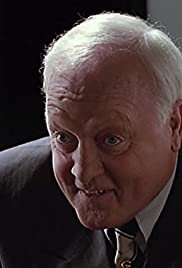
THE MURDER OF ROGER ACKROYD
UK, 2000, 99 minutes, Colour.
David Suchet, Philip Jackson, Oliver Ford Davies, Malcolm Terris, Selena Caddel, Daisy Beaumont, Flora Montgomery, Jamie Bamber, Roger Frost.
Directed by Andrew Grieve.
This is one of the 70 television features, novels and short stories, mysteries by Agatha Christie with David Suchet embodying Poirot.
This is one of the earliest novels by Agatha Christie and had enormous shock value when readers got to the end of the book and discovered who the murderer was. The literary device was a journal by one of the several characters – and final revelation that he had killed Roger Ackroyd. To transfer this experience to the screen is very difficult and many readers will be disappointed at how the plot was handled here – although, the question arises, how else could it have been done?
Poirot is retired, he is friends with an industrialist, Roger Ackroyd, who is murdered. Chief Inspector Japp is also called in and they work together. The central activity focuses on the local doctor, played by Oliver Ford Davies, who has worked with Ackroyd and many of the witnesses and people in the town.
On one level, the mystery is fairly straightforward, obviously some twists, and all explained in a rather long speech by the doctor at the end of the film followed by some melodramatics with a gun.
While there is entertainment value in this film, it was very strongly criticised by devotees of the novel and of this television series.
1. The popularity of the television series of mysteries by Agatha Christie featuring David Suchet as Poirot?
2. The popularity of the original novel? The shock ending for the reader? The challenge to make a feature film preserving this shock ending? How successful here? Poirot reading the journal? The discovery of the journal? The gun? The invitation to Dr Shepherd to explain what happened? The arrogance of his journal? Critique of the police investigation?
3. Poirot, living in the country, retired, the contact with Chief Inspector Japp? His friendship with Roger Ackroyd? The visit to the plant? Discussions with Ackroyd? The report of his death? The timeframe? The witnesses? The death of the butler? His interrogating the witnesses? The false telegram about Ralph and his going to the United States? Dr Shepherd commending him on this?
4. The character of Roger Ackroyd, industrialist, ambitious, greed? His wife? Stepson? The plans for the wedding? The wife suspected of killing her husband? Her suicide?
5. The range of characters, Ackroyd’s wife, Flora and her daughter, the prospective wedding? Raymond and his work at the plant? An obvious suspect?
6. Dr Shepherd, the country doctor, his work, visiting his patients? At home with his sister? Her curiosity? His visits to Roger Ackroyd?
7. Poirot assembling the group, his having read the journal? Dr Shepherd’s sister not invited in, in the car, the journal, the gun? Dr Shepherd giving his explanation, his vanity, complacency? His double life? Setting up the record and playing it, the chair moved to disguise it, his changing things back, Parker and noticing, Parker’s death?
8. The doctor’s vanity, his sister giving him the gun, the chase, confronting Poirot and the Chief Inspector? His being shot?
9. The revelation about the maid, the marriage, the testimony, her relief that her husband returned? The happy ending?
When Sparks Fly
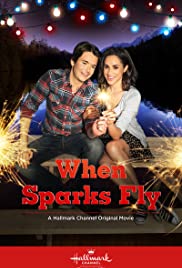
WHEN SPARKS FLY
Canada, 2014, 86 minutes, Colour.
Meghan Markle, Kristina Pesic, Christopher Jacot, Lochlyn Munro.
Directed by Gary Yates.
The main reason for watching this film is to see Meghan Markle in a star role, looking back at her career in the light of her marriage to Prince Harry and becoming part of the British Royal family.
On its release, it was a slight, pleasant romantic comedy, not unlike many others on popular television. An ambitious young woman, getting a position as a journalist in Chicago, leaving behind the young man who was about to propose to her. She keeps in touch with a school friend (an impossibly enthusiastic and gushing Kristina Pesic). She is away from home, where her parents make fireworks and do the displays for July 4. Her friend is to be married – to her one-time boyfriend. She returns home to write an article about her parents and fireworks, to be a bridesmaid, encountering her boyfriend once again – and, we all know what happens… Happy ending all round.
Meghan Markle is a bright and attractive screen presence.
Agatha Christie's Poirot One, Two, Buckle my Shoe

ONE, TWO, BUCKLE MY SHOE
UK, 1992, 103 minutes, Colour.
David Suchet, Philip Jackson, Joanna Phillips- Lane, Peter Blythe, Carolyn Colquhoun, Christopher Eccleston, Karen Gledhill, Laurence Harrington, Rosalind Knight, Sarah Stewart, Helen Horton.
Directed by Edward Bennett.
This is one of the earlier television versions of Poirot’s solving of murder mysteries, with Agatha Christie’s ingenuity and David Suchet embodying Poirot.
The setting is visits to the dentist – who, it seems, kills himself soon after Poirot’s appointment. However, there were a number of other appointments and some manipulation of the timeframe of the alleged suicide.
Chief Inspector Japp works with Poirot on the case, especially in an encounter with a former actress now involved in charity work but returning from India. Not only does the dentist die but this woman also disappears – and the body of another dead woman is discovered.
The main suspect, played by Christopher Eccleston who in 12 years time was to be Doctor Who, arrested, a surly man, but loved by the assistant to the dentist. As always, there are quite a number of complications, a prologue in India becoming important, the central character, a financier, involved with American relations, a dead wife, an assistant who turns out to be the solution to the mystery.
1. The title? The nursery rhyme? The motif of the girls playing it on the footpath?
2. The popularity of Agatha Christie’s mysteries? The television series with David Suchet?
3. The London setting, the atmosphere of the 1930s, costumes and decor? Banking? Dentistry? The musical score?
4. The prologue in India, Much Ado, the performance, Blunt and Gerda, the friendship with Mabelle, the announcement of the engagement? Marriage? The shift to 12 years later? (And the footage of the visit of the Prince of Wales to India and the atmosphere of British Empire?)
5. The focus on the dentist? Poirot and his teeth, visits? Friendship with Mr Morley? The other patients? Blunt? Mabelle? Amberiotis? The presence of Frank Carter? The timeframe for the visits? The death of the dentist? The decision about suicide? Mr Morley as a cheerful dentist? The interviews with his sister?
6. Gladys, her being away for the day, the false message? Her relationship with Frank? His being out of work, recruited as a fascist, working as a gardener? His arrest? In prison? His angers? The discussions with Poirot, Poirot his only hope?
7. Mabelle and her story, acting, charity work, returning to England, wanting to see Gerda? The discussions with Amberiotis? Her cheering as with Poirot and the Chief Inspector? Her disappearance? The visit to the house? The dead woman? The false name and address and the married couple?
8. Blunt, his in-laws, very American, the haughtiness of the sister-in-law? Looking down on Poirot? The issues of money and support?
9. Poirot going to the mansion, Blunt and his wealth, his secretary? The story of his wife, her illness and death? The portrait in his office?
10. Frank Carter working as a gardener, his cover, the attempt on Blunt’s life, his assistant overcoming Carter, Carter’s arrest?
11. Poirot, with the chief inspector? The interrogations? The mystery of Mabelle? Finding the alternate body? The issue of stockings, the visit to the room, the body and the buckle on the shoe? The buckle coming loose in the street?
12. The gathering everybody, the explanation of the case, the vindication of Frank Carter? The truth about the events and the time frame? The revelation that the secretary was Gerda, bigamy on the part of Blunt? The resolution?